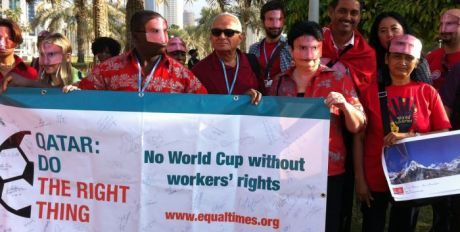News
You are here
Qatar World Cup a death trap for migrant workers

March 31, 2014
The death toll for migrant workers preparing for the 2022 World Cup is staggering. More than 400 Nepalese workers in Qatar have died on Gulf state’s building sites, and more than 500 Indian migrant workers have died in the Western-backed dictatorship since January 2012.
Like the recent Olympics in Russia, the upcoming World Cup in Qatar will cost billions of dollars. And it will be built on the backs of migrant workers, who are literally being worked to death.
There are an estimated 1.2 million migrant workers in Qatar, making up 88 per cent of its total population. Those from India make up 22 per cent, and the same goes for workers from Pakistan. Around 16 per cent are from Nepal, 13 per cent from Iran, 11 per cent from the Philippines, 8 per cent from Egypt and 8 per cent from Sri Lanka. These workers are put at risk by ineffective inspection practices, but also by no enforced minimum wage, with some workers reporting that they receive no wage at all for their work.
According to Sharan Burrow, General Secretary of the International Trade Union Confederation,“Forced labour continues in Qatar today with no workers’ rights. No migrant worker can be protected by any safety standard unless they have the right to collectively speak out about wages and conditions at work.”
Many are then further oppressed by the kafala sponsorship system, which ties workers to their employers, who can take the employees passport and prevent them from leaving. It is common for these workers to be starving at the workplace, and to be supported by family members that they had intended to support by working in Qatar.
The United Nations and Amnesty International have raised concerns about the conditions for migrant workers in Qatar, including concern for the level of accidents on construction sites, and other hazardous working conditions that have resulted in injuries and deaths. The UN has further encourages the energy-rich state to introduce measures to protect workers, such as a minimum wage for all employees, the right for workers to organize, and allowing migrant workers to change jobs. They also strongly advised an “effective labor inspection system,” with more inspectors “well trained on human rights standards, and interpreters in the most commonly used languages.”
Qatar World Cup organizers have responded to concerns about conditions for migrant workers in the Gulf nation by publishing detailed standards. The Qatar World Cup organisers claim that by holding their own contractors to higher standards they can create momentum for change and that improved rights for workers could be one legacy benefit of hosting the tournament. But only companies directly building World Cup venues must abide by these standards, not those with government contracts for wider infrastructure projects, such as building roads, hotels and railways. And other World Cup organizing—from South Africa to Brazil—have been festivals for corporate profits while working conditions and public services have suffered.
At this time it is not known what, if any, changes have been made. FIFA has also stated that Qatar is not at risk for losing the 2022 World Cup despite the deaths and working condition.
Section:









